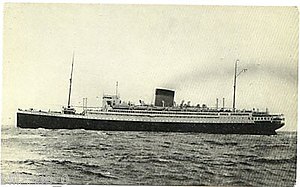SS De Grasse was a transatlantic liner built in 1921 by Cammell Laird, Birkenhead, United Kingdom for Compagnie Générale Transatlantique, and launched in February 1924. In August 1924 De Grasse set sail on her maiden voyage from Le Havre to New York. After the fall of France to Nazi Germany, the ship was used as a barracks ship. Sunk at Bordeaux, France, during the German retreat, she was refloated, repaired, and put back into service. Over the years, she became Empress of Australia and then Venezuela. She ran aground off Cannes, France, in 1962 and was scrapped at La Spezia, Italy.[3]
 De Grasse in the 1950s, rebuilt with one funnel
| |
| History | |
|---|---|
| Name |
|
| Owner |
|
| Operator | 1953–1956: |
| Port of registry | |
| Route | 1924: Le Havre – New York |
| Builder | Cammell Laird, Birkenhead[1] |
| Yard number | 886 |
| Laid down | 23 March 1920 |
| Launched | 23 February 1924 |
| Completed | August 1924 |
| Maiden voyage | 21 August 1924 |
| In service | 1924 |
| Out of service | 1962 |
| Identification |
|
| Fate | Sank after ran aground, before scrap in 1962 |
| General characteristics [2] | |
| Type | Ocean liner |
| Tonnage | |
| Length | 552.1 ft (168.3 m)[2] |
| Beam | 71.4 ft (21.8 m) |
| Depth | 42.3 ft (12.9 m) |
| Decks | 4 |
| Propulsion | |
| Speed | 17 knots (31 km/h; 20 mph) |
History
editCGT
editOriginally speculated ordered under the name Suffren, the ship was renamed after the Compagnie Générale Transatlantique (CGT) acquired the Brazilian ship Leopoldina. De Grasse was put into service in August 1924 between Le Havre and New York.[1] It was modernized in 1931.
At the start of World War II, it continued its crossings, but in a slightly militarized version (blocked portholes, light armament). In the spring of 1940, it was transformed into a troop transport. The ship was decommissioned in May 1940 at Bordeaux.[1] It was then used as a floating barracks ship for German soldiers and then as a base ship for Italian submariners (Italy had based more than twenty submarines at Bordeaux to support the Germans during the Battle of the Atlantic). Appearing as too dangerous a target after the first British bombardment on Bordeaux, the ship surrendered to the Vichy government in May 1942, which used it as a training ship.
The Germans partly sank it during their retreat in August 1944. It was refloated in August 1945 and sent to the Penhoët shipyards to be repaired and modernized (it lost a funnel during these transformations).[1] The ship was reassigned to the Le Havre to New York route while the CGT reconstituted a fleet.
Canadian Pacific
editIn 1953, De Grasse was sold to Canadian Pacific Steamships after the ship, RMS Empress of Canada caught fire and capsized. De Grasse was renamed in that same year to Empress of Australia. However, she did not serve Canadian Pacific for long as in 1956 the ship was sold to the Italian company Sicula Oceanica.[4]
Sicula Oceanica
editIn 1956, Empress of Australia was sold to Sicula Oceanica, and after a refit, the ship was renamed Venezuela and served the Naples to the Caribbean route. She had an uneventful career with her new owner.[4] In 1962, Venezuela was wrecked off Cannes. She was refloated but was broken up at La Spezia, Italy in August of the same year.[3]
Notable passengers
editIn 1924 De Grasse transported British actor Arthur Margetson and his wife Rosamund on its maiden voyage from Le Havre, arriving in New York on 5 September.
In April 1930 De Grasse transported Arturo Toscanini and the 114 members of the New York Philharmonic Orchestra from New York City to Le Havre on the outbound leg of the orchestra's first European tour.
In 1949, Jacqueline Bouvier travelled aboard De Grasse on a study abroad trip to Paris.[5]
See also
editReferences
edit- ^ a b c d "De Grasse (I)". The Great Ocean Liners. February 2024.
- ^ a b "SS. De Grasse". Relevant Search Scotland. Archived from the original on 25 January 2022. Retrieved 25 January 2022.
- ^ a b "Brief Maritime History - De Grasse 1924". YouTube.
- ^ a b Haworth, R.B. Miramar Ship Index: ID #1185887[dead link]
- ^ Mah, Anne (23 June 2019). "A Year in Paris That Transformed Jacqueline Kennedy Onassis". The New York Times. Retrieved 30 December 2021.
Further reading
edit- Haworth, R.B. Miramar Ship Index: ID #1185887.
- Tate, E. Mowbray. (1986). Transpacific Steam: The Story of Steam Navigation from the Pacific Coast of North America to the Far East and the Antipodes, 1867-1941. New York: Cornwall Books. ISBN 978-0-8453-4792-8 (cloth)